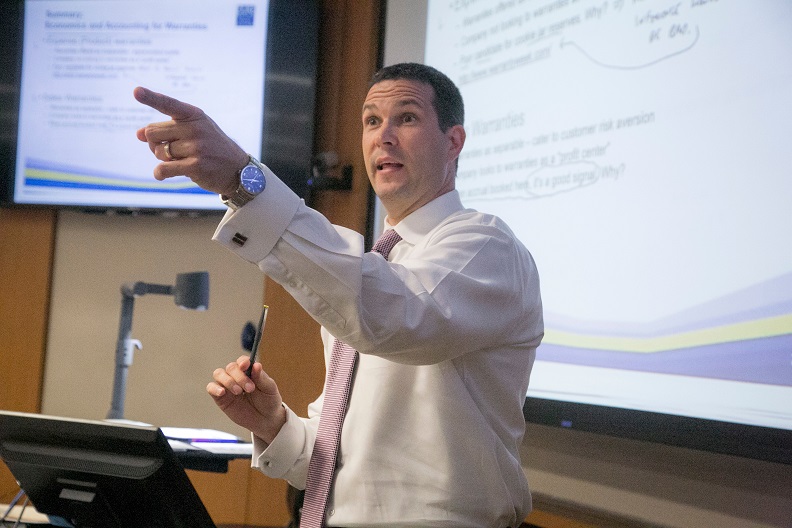When Duke University Fuqua School of Business Professors Bill Mayew and Mohan Venkatachalam found machines could help detect financial statement fraud from conference calls, they immediately wondered how well auditors would fare.
The Public Company Accounting Oversight Board (PCAOB) tells auditors listen to conference calls to assess fraud risk. But research has shown human judges, even experts, are rarely any better than chance at detecting lies.
Mayew and Venkatachalam (along with Jessen Hobson and Mark Peecher of the University of Illinois) secured rare access to seasoned auditors to assess how well they could detect fraud from public company conference calls. Mayew discusses his findings in this Fuqua Q&A.
Q: What did you find auditors can do to better detect fraud?
We figured experienced auditors had the ability to detect fraud. We just had to find a way to help them tap into their potential. The theory is that auditors have an illusion of objectivity that leads them to look past signals of fraud, so we provided them with evidence that made it hard to dismiss the signal. We prompted them with research that found that cognitive dissonance of the CEO -- manifested in the discomfort and uneasiness a person feels when lying -- has been shown to be useful for detecting deception.
That instruction doesn't teach an auditor what exactly to look for in the call, but if an auditor has the ability to pick up on speech clues suggesting deception, the prompting makes it harder to look past those clues. We found auditors we randomly assigned to receive the prompt were able to identify fraud firms with 70 percent accuracy. We also found this effect was not limited to making overall judgments about whether a firm was being fraudulent. We found auditors could accurately identify the specific sentences pertaining to the fraud at better than chance levels. If an auditor can recognize there is a problem when a manager is talking about revenue recognition, for example, then they know to spend more time studying the revenue numbers.
Q: What can firms and regulators take from your findings?
The PCAOB and audit firms struggle with the mandate for seeking out fraud because it's so tough to uncover. The PCAOB standards already state that auditors should consider conference calls for signs of heightened fraud risk, but the standards do not articulate what specifically to look for. Our study suggests the standard has merit and offers some direction on how it might be applied.
Audit firms would naturally like to know what level of staffing to put toward this deception detection task. Does it need to be an audit partner or could it be a staff accountant? We can't yet tell what is optimal but we do establish some boundaries. We see the ability to detect fraud using auditors with 24 years of experience, but we see no effects using auditing students. This implies the ability to detect fraud becomes part of an auditor's skillset at some point during a career.
Q: How did you assess auditor ability to detect financial deception?
We took 10 five-minute recordings of earnings conference calls where CEOs answered questions from analysts. Five of the calls we labeled fraudulent and five non-fraudulent, based on whether the company's financial statements discussed during the call were later linked to fraud, investigation or class-action litigation. The 10 recordings were part of the set we used for software to detect deception. Then we had 31 auditors with an average of 24 years' experience listen to four randomly selected recordings. We found auditors were 63 percent accurate in their fraud judgments overall. That's better than chance, but it was driven by auditors being really good at correctly calling a non-fraudulent firm "clean" - their accuracy was 83 percent for those firms. But among fraudulent firms, they were no better than chance -- until we prompted them.
Q: So auditors can detect the absence of fraud better than the presence of fraud?
Unlike other experts commonly studied regarding deception, auditors have a recurring economic relationship with the companies they audit. Police offers, for example, are not paid by the suspects they interrogate. Auditors are paid by the firms they audit and repeatedly interrogate the same firm each year. Because of the economic relationship, over time, auditors learn to look past fraud signals. They don't want to falsely accuse a client of fraud. That's bad for business and strains the economic relationship. Fraud is quite rare, but pressure from the client to lower fees and avoid budget overruns makes the cost of false accusations a more recurring and salient issue. In turn, auditors subconsciously get used to finding ways to not falsely accuse companies because they deal with client pressure much more frequently over time than dealing with an actual occurrence of fraud.
Q: If auditors are prompted every time, is there a risk the priming effect will wear off? How can auditors avoid that?
It's hard to say. A forensic specialist sent in to review conference calls would not have the same pressures to ignore signals as an audit partner, but we did not assess how well forensic specialists fare at detecting deception. Still, if experienced auditors remain responsible for conference call reviews, it's not clear the priming effects would wear off. If they are reminded repeatedly over time to consider cognitive dissonance, it could permanently shatter the illusion of objectivity and address that underlying problem.
